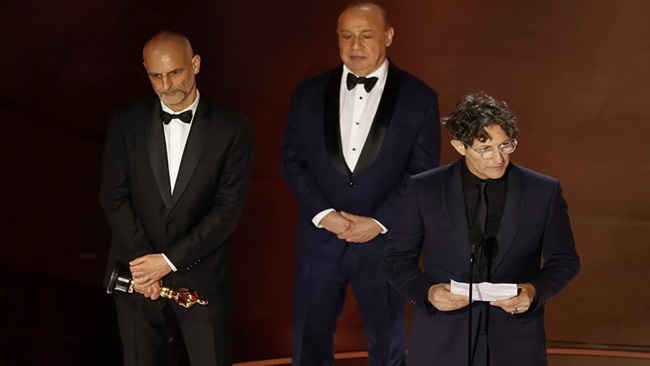Oscars: Jonathan Glazer makes Gaza statement in speech
Director Jonathan Glazer focused on the war in Gaza in his acceptance speech at the Oscars, saying he refuted his “Jewishness and the Holocaust being hijacked by an occupation”.
His film about Auschwitz and the Holocaust – The Zone of Interest – won the best international film award.
Glazer said those killed in both Israel and Gaza were victims of “dehumanisation”.
Celebrities, including Billie Eilish, also wore pins calling for a ceasefire.
The awards night started slightly later than planned on Sunday, after protesters, also demanding a ceasefire, blocked traffic outside the venue.
US media reported that around 1,000 people took part in the demonstration outside the Dolby Theatre. A cascade of limousines heading towards the venue were blocked by the protesters, with some stars – including Killers of the Flower Moon star Lily Gladstone – being forced to abandon their vehicles.
Glazer said it was an “honour” to win the award – the UK’s first win for the category. The German-language film, which earned a total of five Oscar nominations, focuses on the family of Auschwitz’s longest-serving commandant, Rudolf Höss.
Höss ran the Auschwitz concentration camp between 1940 and 1943. An estimated 1.1 million people were murdered there – one million of whom were Jews.
After thanking those who worked with him on the film, Glazer – reading from a pre-written speech – said: “All our choices were made to reflect and confront us in the present, not to say look what they did then, rather what we do now.
“Our film shows where dehumanisation leads at its worst. It’s shaped all of our past and present.”
The director, who is Jewish, added: “Right now, we stand here as men who refute their Jewishness and the Holocaust being hijacked by an occupation which has led to conflict for so many innocent people.
“Whether the victims of October 7th in Israel, or the ongoing attack on Gaza, all the victims of this dehumanisation, how do we resist?”
Palestinians in the West Bank and eastern Jerusalem have lived under Israeli occupation since 1967.
The director previously told the BBC that his film “looks into dark corners of human capacity”, and is relevant today.
“I think what’s inside this film is what we do to each other as human beings,” he said. “We see others as lesser than ourselves, different from ourselves. Somehow, step by step, that leads to atrocity.”
Source: BBC




